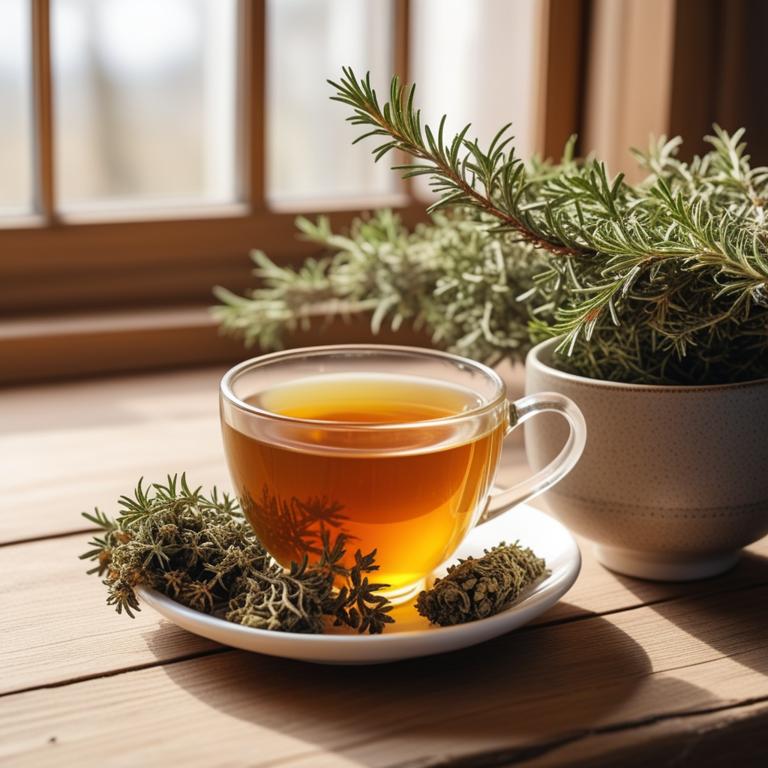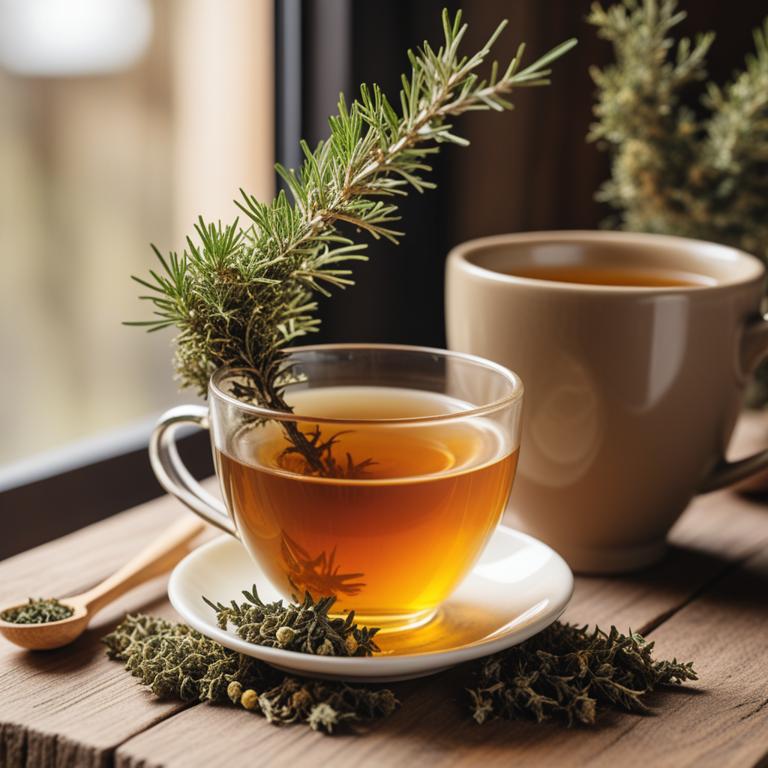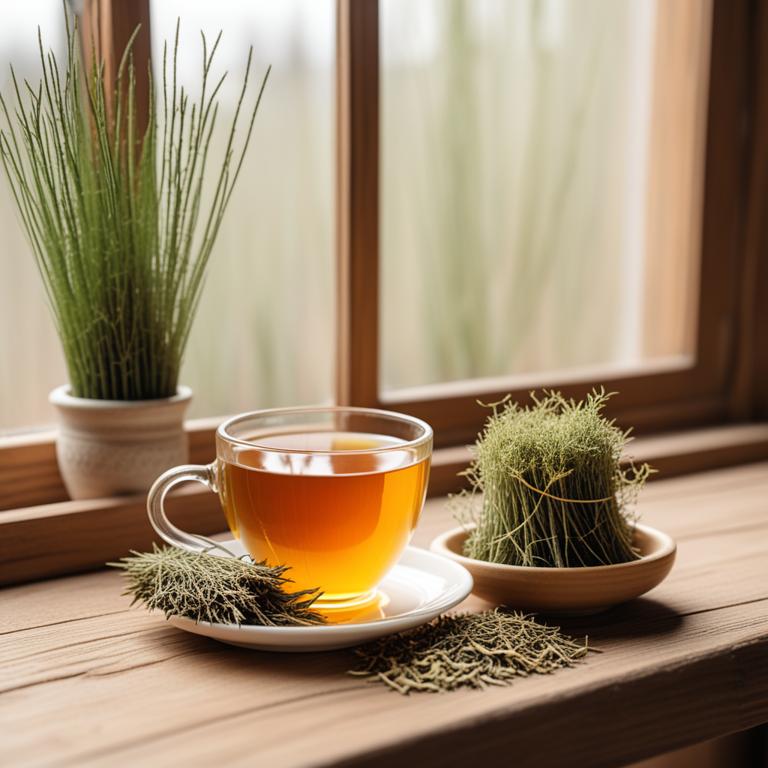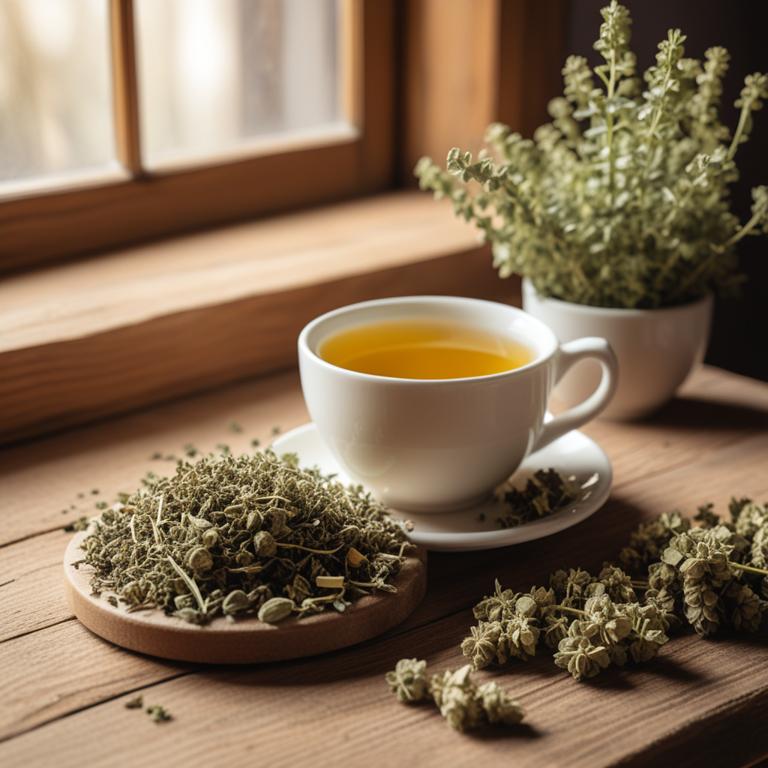13 Best Herbal Teas For Bladder Infection

Herbal teas for Bladder infection are natural remedies made from various herbs that help alleviate symptoms of urinary tract infections (UTIs) and promote overall urinary health.
These teas are rich in antioxidants, anti-inflammatory properties, and antimicrobial agents that help combat bacterial infections and soothe the bladder.
Examples of herbal teas used to treat bladder infections include Uva Ursi, which has antiseptic properties that help combat bacterial growth, and Juniper Berries, which reduce inflammation and ease pain.
Other beneficial herbal teas include Dandelion Root, which helps flush out bacteria from the urinary tract, and Echinacea, which boosts the immune system to fight off infections, while Marshmallow Root and Corn Silk help soothe and calm the bladder, reducing discomfort and promoting healing.
According to "International journal for vitamin and nutrition research. Internationale Zeitschrift fur Vitamin- und Ernahrungsforschung. Journal international de vitaminologie et de nutrition", teas for bladder infection may be beneficial due to their potential natural compounds such as D-mannose and cranberry extracts that were proven effective in inhibiting UPEC adhesion to bladder cells and restraining bacterial growth.
Below there's a list of the 13 best herbal teas for bladder infection.
- 1. Juniperus communis teas
- 2. Berberis vulgaris teas
- 3. Equisetum arvense teas
- 4. Solidago virgaurea teas
- 5. Silybum marianum teas
- 6. Achillea millefolium teas
- 7. Taraxacum officinale teas
- 8. Echinacea purpurea teas
- 9. Cinchona officinalis teas
- 10. Glycyrrhiza glabra teas
- 11. Foeniculum vulgare teas
- 12. Origanum vulgare teas
- 13. Sambucus nigra teas
Also you may be interested in...
TODAY'S FREE BOUNDLE
Herb Drying Checklist + Herbal Tea Shopping List + Medicinal Herbs Flashcards
Enter you best email address below to receive this bundle (3 product valued $19.95) for FREE + exclusive access to The Aphotecary Letter.
$19.95 -> $0.00
1. Juniperus communis teas

Juniperus communis teas, derived from the needles of the common juniper tree, have been traditionally used to treat bladder infections due to their anti-inflammatory and antimicrobial properties.
The bioactive constituents, including terpenes and flavonoids, help to reduce inflammation and combat bacterial infections in the urinary tract, thereby alleviating symptoms such as pain and discomfort.
The antiseptic properties of Juniperus communis teas also help to prevent the growth of harmful bacteria, promoting a healthy balance of gut bacteria and reducing the risk of future infections.
The benefits of using Juniperus communis teas to treat bladder infections include natural relief from symptoms, reduced risk of antibiotic resistance, and a gentle, non-invasive approach to promoting urinary tract health.
2. Berberis vulgaris teas

Berberis vulgaris teas, also known as European barberry, have been traditionally used to treat bladder infections due to their anti-inflammatory and antimicrobial properties.
The bioactive constituents present in these teas, including berberine, a plant alkaloid, help to combat bacterial infections in the urinary tract by inhibiting the growth of pathogenic bacteria such as E. coli.
Berberis vulgaris teas also possess diuretic properties that help to increase urine production, thereby flushing out the infected bacteria from the urinary system and providing relief from symptoms such as burning micturition and frequency of urination.
The benefits of using Berberis vulgaris teas to treat bladder infections include reduced symptoms, accelerated recovery, and a natural approach to managing this common health issue.
3. Equisetum arvense teas

Equisetum arvense teas, also known as horsetail tea, have been traditionally used to treat bladder infections due to their anti-inflammatory and diuretic properties.
The tea helps to treat this ailment by reducing inflammation in the urinary tract and increasing urine production, which helps to flush out bacteria causing the infection.
The bioactive constituents of horsetail tea, including silica, flavonoids, and alkaloids, contribute to its antimicrobial and antioxidant properties, which help to combat the infection.
The benefits of using Equisetum arvense teas to treat bladder infections include reduced symptoms, improved urinary function, and a lower risk of complications, making it a natural and effective alternative to pharmaceutical treatments.
4. Solidago virgaurea teas

Solidago virgaurea teas have been traditionally used to treat bladder infections due to their anti-inflammatory and antimicrobial properties.
The herbal preparation helps to treat this ailment by reducing inflammation in the urinary tract and preventing the growth of bacteria that cause infection.
The bioactive constituents of Solidago virgaurea, including flavonoids and phenolic acids, have been shown to exhibit antimicrobial activity against various pathogens, including E. coli, which is a common cause of urinary tract infections.
Regular consumption of Solidago virgaurea teas may help alleviate symptoms of bladder infections, such as painful urination and frequent urination, and reduce the risk of recurrent infections.
5. Silybum marianum teas

Silybum marianum teas, also known as milk thistle teas, have been traditionally used to treat bladder infections due to their anti-inflammatory and antimicrobial properties.
The bioactive constituents present in these teas, including silymarin and flavonoids, help to reduce inflammation and combat bacterial infections in the urinary tract.
This herbal preparation helps to treat bladder infections by preventing bacterial adhesion to the bladder wall, thereby reducing the severity of symptoms and promoting a faster recovery.
The benefits of using Silybum marianum teas to treat bladder infections include reduced symptoms, improved urinary function, and a lower risk of complications.
6. Achillea millefolium teas

Achillea millefolium teas, also known as yarrow tea, have been traditionally used to treat bladder infections due to their anti-inflammatory and antibacterial properties.
The bioactive constituents such as flavonoids, coumarins, and sesquiterpenes present in this herbal preparation help to reduce inflammation, fight off bacterial infections, and promote healing in the urinary tract.
By consuming yarrow tea, individuals can help to alleviate symptoms of bladder infections, such as pain and discomfort, and promote the body's natural healing process.
The benefits of using Achillea millefolium teas to treat bladder infections include reduced symptoms, improved urinary tract health, and a natural, non-invasive approach to managing this common ailment.
7. Taraxacum officinale teas

Taraxacum officinale teas have been traditionally used to treat bladder infections due to their anti-inflammatory and antimicrobial properties, which help to combat bacterial growth and reduce inflammation in the urinary tract.
The bioactive constituents, including flavonoids, saponins, and terpenoids, possess potent antioxidant and antibacterial activities that contribute to their therapeutic effects.
By consuming Taraxacum officinale teas, individuals can alleviate symptoms such as burning urination, frequency, and urgency, ultimately promoting healing and comfort in the bladder and urinary tract.
The benefits of using Taraxacum officinale teas to treat bladder infections include reduced symptoms, prevention of complications, and a natural, non-invasive approach to managing this common and often uncomfortable condition.
8. Echinacea purpurea teas

Echinacea purpurea teas have been traditionally used to treat bladder infections due to their anti-inflammatory and antimicrobial properties.
The herbal preparation helps to treat this ailment by reducing inflammation in the urinary tract, fighting off bacterial infections, and promoting the body's natural defenses.
Echinacea purpurea teas contain bioactive constituents such as alkylamides, caffeic acid derivatives, and flavonoids, which are responsible for its antimicrobial and anti-inflammatory effects.
The benefits of using Echinacea purpurea teas to treat bladder infections include reduced symptoms, prevention of bacterial resistance, and promotion of a healthy urinary tract.
9. Cinchona officinalis teas

Cinchona officinalis teas are a natural remedy used to treat bladder infections due to their anti-inflammatory and antimicrobial properties.
The quinine and other bioactive compounds present in these teas help to alleviate symptoms and combat the underlying infection by inhibiting the growth of bacteria and reducing inflammation in the urinary tract.
The benefits of using Cinchona officinalis teas for treating bladder infections include reduced symptoms, such as pain and discomfort, and improved overall urinary health.
Additionally, the natural antimicrobial properties of these teas help to prevent the development of antibiotic-resistant bacteria, making them a more sustainable treatment option.
10. Glycyrrhiza glabra teas

Glycyrrhiza glabra teas, also known as licorice root tea, have been traditionally used to treat bladder infections due to their anti-inflammatory, antimicrobial, and antiseptic properties.
The bioactive constituents of this herbal preparation, including glycyrrhizin and flavonoids, help to reduce inflammation, combat bacterial growth, and alleviate symptoms associated with bladder infections.
These properties assist in treating bladder infections by soothing the bladder lining, reducing pain and discomfort, and promoting a healthy urinary tract environment.
The benefits of using Glycyrrhiza glabra teas for treating bladder infections include reduced symptoms, improved urinary tract health, and a natural and non-invasive approach to managing this common ailment.
11. Foeniculum vulgare teas

Foeniculum vulgare teas, also known as fennel tea, have been traditionally used to treat bladder infections due to its anti-inflammatory and antimicrobial properties.
The herbal preparation helps to treat this ailment by reducing inflammation and promoting the elimination of bacteria from the urinary tract.
Foeniculum vulgare teas contain bioactive constituents such as anethole, limonene, and trans-anethole, which have been shown to exhibit antimicrobial and anti-inflammatory activities, thereby helping to alleviate symptoms of bladder infections.
The benefits of using fennel tea to treat bladder infections include its ability to reduce pain and discomfort, prevent urinary tract infections, and promote a healthy balance of gut bacteria.
12. Origanum vulgare teas

Origanum vulgare teas, also known as oregano tea, have been traditionally used to treat bladder infections due to their antimicrobial and anti-inflammatory properties.
The bioactive constituents such as carvacrol and thymol in oregano tea help to treat bladder infections by inhibiting the growth of bacteria like E. coli, which is a common cause of bladder infections, and reducing inflammation in the urinary tract.
Drinking oregano tea may help to alleviate symptoms of bladder infections such as pain and burning sensation while urinating, and may also help to prevent the development of antibiotic-resistant bacteria.
The benefits of using oregano tea to treat bladder infections include its natural and non-invasive approach, making it a popular choice for those seeking alternative remedies for this common ailment.
13. Sambucus nigra teas

Sambucus nigra teas, also known as elderberry tea, have been used traditionally to treat bladder infections due to their anti-inflammatory and antimicrobial properties.
The bioactive constituents, such as flavonoids, phenolic acids, and anthocyanins, in Sambucus nigra teas help to reduce inflammation and combat bacterial infections in the urinary tract.
By inhibiting the growth of bacteria and reducing oxidative stress, Sambucus nigra teas can help alleviate symptoms of bladder infections, including pain, urgency, and frequency.
The benefits of using Sambucus nigra teas to treat bladder infections include their potential to reduce the risk of antibiotic resistance and promote a natural, holistic approach to healing.